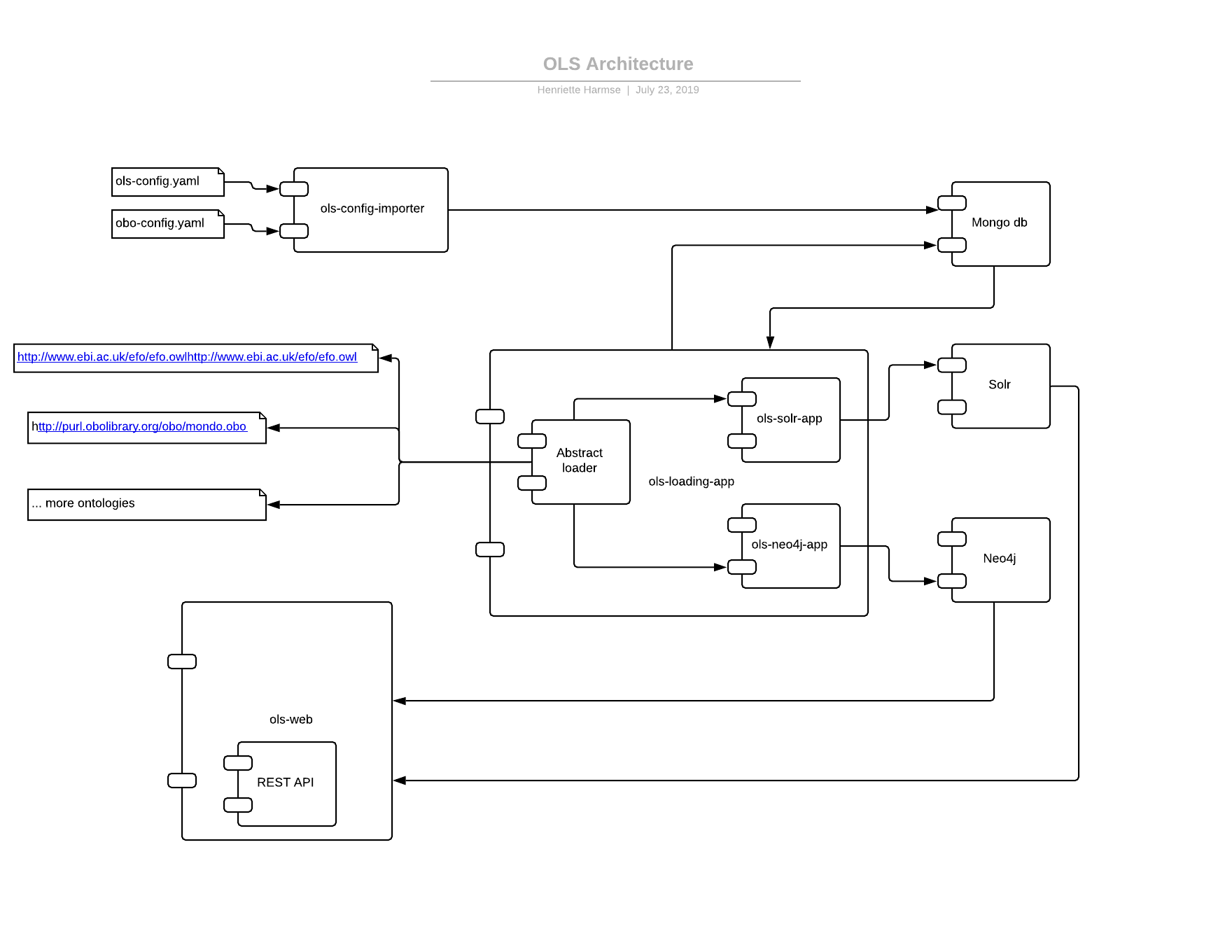Check out https://github.com/EBISPOT/ols4 for updates on the new version!
Legacy Ontology Lookup Service from SPOT at EBI.
- OLS is currently live at the EBI here http://www.ebi.ac.uk/ols
- A REST API for OLS is described here http://www.ebi.ac.uk/ols/docs/api
- Instructions on how to build a local OLS installation are here http://www.ebi.ac.uk/ols/docs/installation-guide
- Run OLS with docker here https://github.com/EBISPOT/ontotools-docker-config
- Further OLS documentation can be found here http://www.ebi.ac.uk/ols/docs
This is the entire codebase for the EBI OLS. OLS has been developed around two key ontology indexes that can be built and used independently from the core website. We provide services to build a Solr index and a Neo4j index. The Solr index is used to provide text-based queries over the ontologies while the Neo4j index is used to query the ontology structure and is the primary driver of the OLS REST API.
OLS has been developed with the Spring Data and Spring Boot framework. You can build this project with Maven and the following Spring Boot applications will be available to run.
All of the apps are available under the ols-apps module.
- ols-apps/ols-solr-app - Spring Boot application for building a Solr index for one or more ontologies. Requires access to a Solr server.
- ols-apps/ols-neo4j-app - Spring Boot application for building a Neo4j index for one or more ontologies. Builds an embedded Neo4j database. You can run a Neo4j server that uses the generated Neo4j database.
To run a complete local OLS installation you will need a MongoDB database. This is a lightweight database that is used to store all the ontology configuration and application state information. See here for more information http://www.ebi.ac.uk/ols/docs/installation-guide
- ols-apps/ols-config-importer - Spring Boot application for loading config files into the MongoDB database. This includes support for reading config files specified using the OBO Foundry YAML format.
- ols-apps/ols-indexer - Spring Boot application for building the complete OLS indexes. This app fetches ontologies specified in the config files, checks whether they have changed from a previous download, and if they have changed, will create all the necessary Solr and Neo4j indexes.
- ols-web - This contains the WAR file that can be deployed in Tomcat to launch the OLS website and REST API. It depends on [ols-term-type-treeview] (https://github.com/EBISPOT/ols-term-type-treeview) and [ols-tabbed-term-treeview] (https://github.com/EBISPOT/ols-tabbed-term-treeview).
The preferred method of deployment for OLS is using Docker. If you would like to deploy the entire OntoTools stack (OLS, OxO, and ZOOMA), check out the OntoTools Docker Config repository. If you would like to deploy OLS only, read on.
First, create the necessary volumes:
docker volume create --name=ols-neo4j-data
docker volume create --name=ols-mongo-data
docker volume create --name=ols-solr-data
docker volume create --name=ols-downloads
Then, start solr and mongodb only:
docker-compose up -d solr mongo
Then, adjust the configuration YAML files in the config directory as required,
and load the configuration into the Mongo database using the config loader:
docker run --net=host -v $(pwd)/config:/config ebispot/ols-config-importer:stable
Then, run the indexer:
docker run --net=host -v ols-neo4j-data:/mnt/neo4j -v ols-downloads:/mnt/downloads ebispot/ols-indexer:stable
Finally, start the OLS webserver:
docker-compose up -d ols-web
You should now be able to access a populated OLS instance at http://localhost:8080.
Rather than using the images from Docker Hub, the Docker images can also be built using the Dockerfiles in this repository.
docker build -f ols-apps/ols-config-importer/Dockerfile -t ols-config-importer .
docker build -f ols-apps/ols-indexer/Dockerfile -t ols-indexer .
To build OLS you will need to use Java 8 and Maven 3.x.
To build OLS, in the root directory of OLS, run:
mvn clean package. Currently this will fail with the following error:
[ERROR] Failed to execute goal on project ols-neo4j: Could not resolve dependencies for project uk.ac.ebi.spot:ols-neo4j:jar:3.2.1-SNAPSHOT: Failed to collect dependencies at org.springframework.data:spring-data-neo4j:jar:3.4.5.RELEASE -> org.neo4j:neo4j-cypher-dsl:jar:2.0.1: Failed to read artifact descriptor for org.neo4j:neo4j-cypher-dsl:jar:2.0.1: Could not transfer artifact org.neo4j:neo4j-cypher-dsl:pom:2.0.1 from/to maven-neo4j (https://m2.neo4j.org/content/repositories/releases/): Failed to transfer file https://m2.neo4j.org/content/repositories/releases/org/neo4j/neo4j-cypher-dsl/2.0.1/neo4j-cypher-dsl-2.0.1.pom with status code 502 -> [Help 1]
To correct this, copy the contents of the build-fix directory into your Maven
repository under ~/.m2/repository.
Run mvn clean package again. OLS should now build successfully.
Other build errors you may come across are the following:
- Wrong version of Java used:
[ERROR] Failed to execute goal org.apache.maven.plugins:maven-compiler-plugin:3.1:compile (default-compile) on project ols-solr: Compilation failure: Compilation failure: [ERROR] /Users/james/OLS/ols-solr/src/main/java/uk/ac/ebi/spot/ols/config/SolrContext.java:[15,24] package javax.annotation does not exist [ERROR] /Users/james/OLS/ols-solr/src/main/java/uk/ac/ebi/spot/ols/config/SolrContext.java:[25,4] cannot find symbol [ERROR] symbol: class Resource [ERROR] location: class uk.ac.ebi.spot.ols.config.SolrContext [ERROR] -> [Help 1]
This is the error you get when you compile OLS with Java 11. The fix for this build error is to ensure your Maven installation is indeed using Java 8 for compilation.
It is possible to customise several branding options in ols-web/src/main/resources/application.properties:
ols.customisation.debrand— If set to true, removes header and footer, documentation, and about pageols.customisation.ebiInfo— If set to true, EBI specific banners are enabledols.customisation.title— A custom title for your instance, e.g. "My OLS Instance"ols.customisation.short-title— A shorter version of the custom title, e.g. "MYOLS"ols.customisation.description— A description of the instanceols.customisation.org— The organisation hosting your instanceols.customisation.hideGraphView— Set to true to hide the graph viewols.customisation.errorMessage— Message to show on error pagesols.customisation.ontologyAlias— A custom word or phrase to use instead of "Ontology", e.g. "Data Dictionary"ols.customisation.ontologyAliasPlural— AsontologyAliasbut plural, e.g. "Data Dictionaries"ols.customisation.oxoUrl— The URL of an OxO instance to link to with a trailing slash e.g.https://www.ebi.ac.uk/spot/oxo/
